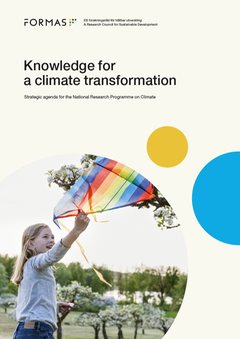Knowledge for a climate transformation
In this strategic agenda, we present the objectives, thematic orientations and work methods of the National Research Programme on Climate.
This is a revised version of the original agenda, which was published in 2018 in connection to the establishment of the programme. The revision has been made in light of the lessons learned during the first years of the programme and the additional funding provided by the government starting in 2021. The revision was carried out in 2021.
Read the summary below or download the full report.
Published: 27 April 2022
Report: R7:2021
ISBN: 978-91-540-6141-9
Language: English
Summary

Strategic agenda for the National Research Programme on Climate
The National Research Programme on Climate stems from a government commission received by Formas and spans the period 2017–2026. The climate research programme, which is one of thirteen national research programmes, was established by the government to meet its goal of addressing societal challenges posed by climate change in Sweden and around the world. The programme’s aim is to provide knowledge for a profound transformation of society that addresses climate challenges. This will be done by funding research and innovation that can help to achieve rapid emission reductions, adapt societies to a changing climate, and promote climate efforts in line with long-term sustainable development.
In this strategic agenda, we present the objectives, thematic orientations and work methods of the National Research Programme on Climate. This is a revised version of the original agenda, which was published in 2018 in connection to the establishment of the programme. The revision has been made in light of the lessons learned during the first years of the programme and the additional funding provided by the government starting in 2021. The revision was carried out in 2021.
In addition to meeting society’s global and national challenges and needs, national research programmes are expected to coordinate and pool research in one area as well as to enable interdisciplinary and cross-sectoral collaboration.
To promote synergies among different stakeholders who complement each other in terms of knowledge, expertise and mission, the National Research Programme on Climate has an advisory committee and a working group that consist of research funders relevant to the field. The committee is headed by a chair.
This strategic research agenda identifies six key themes and four cross-cutting perspectives, which together create a framework of priority areas that will guide the research programme’s activities. The six themes are based on analyses of the challenges surrounding, and the goal context of, the national programme as well as on analyses of knowledge gaps in society on climate transformation. These starting points have subsequently been related to current investments in climate research and innovation, so that the national programme can supplement current climate research.
The six themes and their focus areas are as follows:
- Sustainable innovations for climate efforts, focuses on the next generation of social, organisational, policy and technological innovations that have the potential to make an impactful contribution to transformation and to climate adaptation in Sweden and beyond, while taking into account other global sustainable development goals.
- System-integrated knowledge of climate change, ecosystems and society, highlights the need for in-depth knowledge of the human-nature relationship, the complexity of the climate system, the effects of climate change, and the links between climate change and biodiversity.
The theme also includes a risk perspective. - Production and consumption in line with climate goals, focuses on changing production and consumption patterns and on promoting sustainable resource use in a broader sense. This theme includes entire value chains, climate ethics, and shifting norms and behaviours related to consumption.
- Governance for meeting climate challenges, is about governance,
institutions and leadership that can promote the transformation needed to achieve the climate targets, including decision-making at different levels and organisations, power aspects and the impact of actions. - Economic and financial drivers for climate action, is about how the financial system and different types of investments can contribute to the transformation, as well as the role economic instruments and the economic system have for climate change.
- A democratic and just climate transformation, addresses issues of justice and democracy in the transformation linked to emission reductions as well as to climate adaptation. Ethical issues are also included, as well as questions of representativeness, power and accountability.
In addition to these themes, four cross-cutting perspectives have been identified that provide valuable approaches to the agenda’s themes.
These perspectives are:
- International climate efforts
- Digitalisation
- Synergies and conflicting goals in the sustainable development agenda
- Gender equality, equity and diversity.
In the implementation of the programme, we will initiate research and other activities that combine the themes and perspectives. This is part of capturing the systemic challenges of climate change and the holistic view needed in the transformation. Because of this system view, the programme also interacts with other national research programmes in areas that have especially strong links to climate change. In order to contribute knowledge for a profound transformation that addresses climate challenges, the calls in the programme span a broad repertoire of research approaches and research perspectives as well as offer various types of grants including research support, innovation support and collaboration support. Working methods, calls for proposals, and other activities will be continuously developed during the ten-year programme period and adapted in pace with knowledge development and society’s needs for climate transformation.

